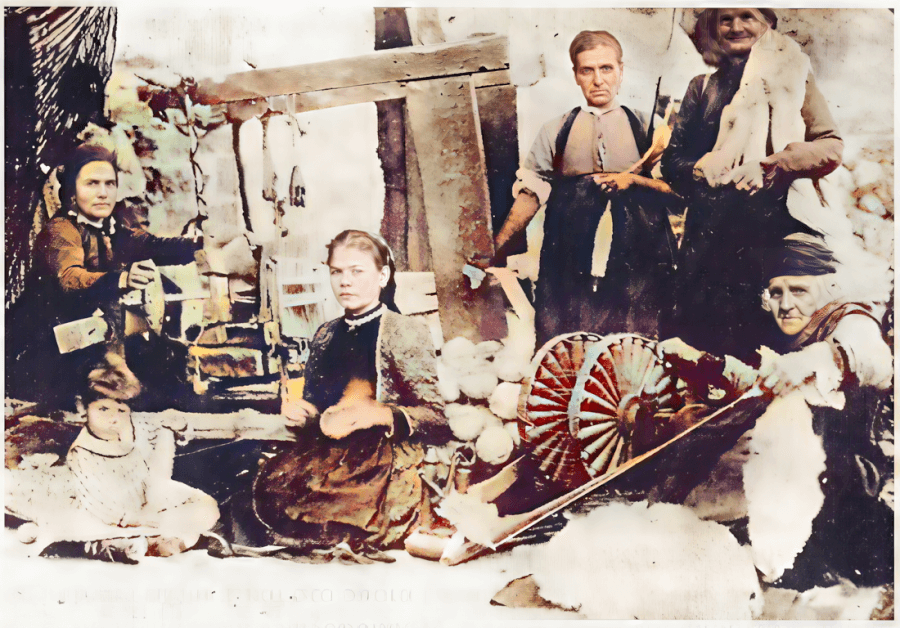
The content of this event is under development.
Title: From Penelope to Golfo - Weaving and Singing
Weaving Workshops ― Folk Songs and Dances ― Visual Arts — Play Readings
Date: Sunday, 7th of September 2025
Place: Mesorrougi, Achaia
Hours: 11:00 – 15:00
Instructors: Elina Menounou (for adults)- Maria Pertsinidou (for children)
Participation: Free of charge
01. WEAVING WORKSHOPS FOR CHILDREN AND ADULTS — A Live Experience of Traditional Weaving
The Golfo Festival, the Theatre Laboratory of Drama and Speech (Department of Theatre Studies – University of Patrs) and the Local Community of Mesorrougi, Municipality of Aigialeia, invite you to two hands-on weaving workshops, tailored separately for adults and children, where art meets tradition.
Participants will have the opportunity to experience the weaving process up close, using a traditional floor loom and small weaving frames, and actively engage in the creation of woven textiles.
The activity begins with a brief overview of the history of weaving and continues with practical instruction by the two facilitators: Elina Menounou and Maria Pertsinidou.
⸻
02. SONGS OF THE LOOM — A Living Musical Tradition
Sakis Papadimitriou, researcher and composer from Aigio, draws well-known songs from the chest of the Moraitic tradition—songs of love, toil, and exile, along with heroic and klephtic ballads of the region. These songs will be performed by members of the Women’s Traditional Choir of the Aigio Music Workshop.
⸻
03. READINGS — Members of the Lighthouse for the Blind of Greece Interpret Golfo
In the spirit of promoting and highlighting inclusion, the Golfo Festival has invited Georgia Louzi-Roukoutaki, General Secretary of the Lighthouse for the Blind of Greece and Head of its Theater Group, to participate with members of her team in a special reading-performance of a scene from Golfo.
⸻
04. VISUAL ARTS
a. WEAVERS — Video Installation
The 2nd Golfo Festival 2025 pays tribute to the pioneering Greek photographers and filmmakers, the Manakia Brothers—Ioannis (Giannakis) and Miltiadis (Miltos)—who, equipped with a British-made Bioscope no. 300 motion picture camera, filmed in May 1905 their centenarian grandmother Despina and other women in the mountain village of Avdella, Grevena, practicing the ancient art of weaving.
The film The Weavers is considered the first Greek short film and is a significant document of early Balkan cinema.
Contemporary Greek composer Apostolos Armagos creates a sonic and musical interpretation of this rare cinematic artifact, stating:
“The music I composed for The Weavers by the Manakia Brothers was born from the moving images themselves: the women’s bodies in action, their rhythm, their repeated gestures. The traditional violin I chose serves as a central motif within a soundscape shaped by electroacoustic elements, bringing to the surface primal emotions intertwined with memory and the ritual of the weaving craft.”
⸻
b. THE THREAD THROUGH TIME: FROM PENELOPE TO GOLFO AND TO THE PRESENT — Visual Installation
Geometric Art was named after the geometrically stylized designs with which the ancient Greeks decorated temples, pottery, textiles, and more. My work is inspired by history and ancient Greek culture, but also by the traditions of the avant-garde. It alludes to Bauhaus and Russian Constructivism, while simultaneously referencing knitting — a traditional female practice.
I design my abstract geometric compositions using fibers, velvet, leather, and metal, with aluminum —my primary material— representing light in contrast to darkness; it is our mirror; it is the fragile metal-symbol of our time: shiny, ephemeral, reflective of consumerism, in contrast to the Antiquity of stone and bronze.
This particular work draws on the ready-made, a contemporary artistic trend that connects the old with the modern. The woven piece from my grandmother, Eirini, embraces my metallic construction and experiences a second life.
Eirini Pagoni – Visual Artist
----
WEAVING: Art, History, Memory, and Contemporary Reconnection
In Mesorrougi — the birthplace of Spyridon Peresiadis — and across the Chelmos region, weaving was primarily a women’s craft until the mid-20th century. Urban migration, emigration, and social change gradually silenced the looms, leaving behind an art that once nourished both body and soul. The solitary act of weaving was often accompanied by song — a form of expression that interwove the weaver’s thoughts, hopes, and memories. Through sound and movement, women inscribed their daily lives onto the fabric of the loom.
The Golfo Festival honors this tradition of female craftsmanship and the anonymous creators behind it, presenting weaving as both a cultural imprint and an artistic practice. Our aim is to offer younger generations a direct, experiential connection to a heritage preserved through collective memory and the manual wisdom of our ancestors. An experience for all who wish to weave once again threads, stories, and art — in the heart of Achaia.
THE WEAVER WOMAN: A Timless presence in Greek memory
The image of the woman at the loom—whether drawn from Homer’s verses, from folk tales, or from childhood memories—is deeply etched into our collective memory. As one travels through the Greek landscape, it becomes clear that each place, each region, has its own distinctive woven textiles to showcase—each a unique expression of skill and local identity.
Weaving is far more than a craft; it is a rich and intricate process that includes spinning, dyeing, warping, threading, and ultimately results in the creation of a finished piece—be it a garment, a blanket, a rug, or any other fabric-based item. These processes are inextricably linked to the social fabric of the community—particularly to the lives and daily rhythms of women.
The loom, once an essential feature in every Greek household, was not just a tool but a symbol of survival, care, and creativity. A woman was expected to master the art of weaving in order to clothe her family, adorn her home, and prepare her dowry.
Preparing the loom was a communal affair. The weaver had many silent collaborators: the shepherd who brought the wool, the woodcutter who selected the right timber, the carpenter who crafted the distaff, the shuttle, and the reel. Warping the loom—a demanding and meticulous task—as well as threading it, was often done with the help of many women, working side by side in coordination, rhythm, and solidarity.
In this timeless craft, one sees not only artistry and labor, but also echoes of a way of life—woven with tradition, cooperation, and memory.
Elina Menounou
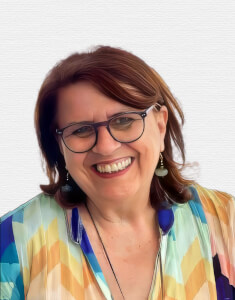 | Angeliki (Elina) Menounou - Educator Angeliki Menounou was born and lives in Xylokastro, Corinthia. She studied economics and later graduated from the School of Early Childhood Education in Chania. For 33 years, she was the owner of the preschool and kindergarten “Kartaetos” (“Kite”). |
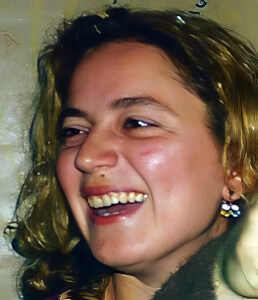 | Maria Pertsinidou - Visual Artist Maria Pertsinidou studied Economics, but a creative spark that had been with her since childhood soon led her to pursue more artistic paths. Over time, she experimented with jewelry making using a variety of materials and techniques. This ongoing search for a personal creative outlet eventually brought her to the art of weaving. Weaving is a primal technique that allows simple shapes and patterns to transform raw materials (such as wool, linen, cotton, silk, etc.) into expressions of emotional complexity. She has presented her work in solo exhibitions. Alongside her artistic practice, she also contucts weaving workshops for children. |
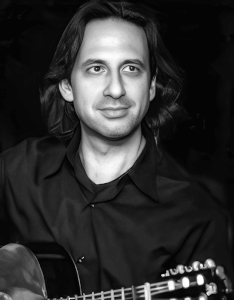 | Dionyssis (Sakis) Papadimitriou - Composer, Musician, Researcher Philologist, musician, and composer. Graduate of the Faculty of Philosophy at the University of Ioannina, the Pedagogical Academy of Ioannina, and the Department of Education at the University of Patras; currently a PhD candidate in Philosophy at the University of Patras. Teacher and soloist of classical guitar, as well as various traditional string and wind instruments. Holder of a degree in Byzantine Music, researcher of Greek music, and founder of the musical ensembles “Aigio Music Workshop” (1992) and “Hydyphono” (2004). His works have been released on CD and have been presented in numerous concerts in Greece and abroad, in collaboration with some of the most renowned Greek performers. |
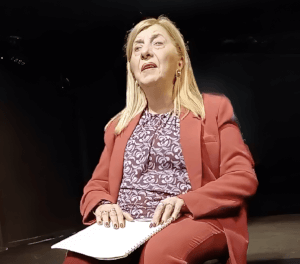 | Georgia Louzi - Roukoutaki - Actress Blind since birth. A graduate of the Department of Political Science at the Athens Law School. She was appointed to the Public Power Corporation (D.E.H.), where she worked for 15 years as a telephone operator. Her involvement with the Lighthouse for the Blind of Greece began in the 1980s, initially as a beneficiary participating in various departments. During this time, she was awarded by the organization for her speed in reading Braille texts. Since 2007, she has been a member and representative of the Lighthouse’s Theater Group, taking on leading roles in plays such as The Jewish Wife by Brecht, Filumena Marturano by Eduardo De Filippo, and The Ghost of Marseilles by Jean Cocteau, among others. She also actively participates in the organization’s Knitting Workshop, generously sharing her knowledge. In 2008, she was honored as a “Blind Mother Role Model,” and in 2025 she was recognized by the Women’s Union of Western Crete “I Vritomartis” as an inspiring example of a woman and mother with a remarkable life journey. Since 2013, she has continuously held an administrative position on the Board of Directors of the Lighthouse for the Blind of Greece. |
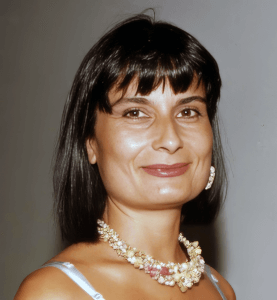 | Eirini Pagoni - Visual Artist Eirini Pagoni was born in Aigeira, Achaia, Greece. She studied Fine Arts at New York University (USA), under Theodoros Pantos. She also studied costume design at the Fashion Institute of Technology in New York and at ESMOD - School of Fashion Design in Paris. At the same time, she pursued theater studies out of a keen interest in theatrical expression. Eirini is a multifaceted personality who moves comfortably across various artistic fields, earning awards and distinctions in both Greece and abroad. Her work has been presented in solo and group exhibitions, and her pieces are part of numerous private collections. |
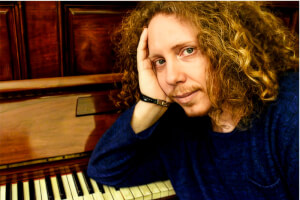 | Apostolos Armagos - Composer Apostolos Armagos is a music composer, producer and sound designer with a unique approach to creating intense and experimental soundtracks. Based in Athens, Greece he studied piano and advanced music theory under Makis Palakas and guitar by John Raptis and Thodore Ziras. He is the composer of the contemporary opera The Shame of the Cyclops, (libretto by Yannis Filias). Since 2013, he has released orchestral works influenced by theatrical, experimental, and jazz music and Greek song collections featuring new singers. In January 2022, he presented his audiovisual installation titled Bluebeard – 12 Hours in the Room of the Cyan-bearded Man in Athens. Official page: https://www.armagosmusic.com/
THE WAEVERS (1905) Filmed by Ioannis and Miltiades Manakias Music by Apostolos Armagos Presented in a continuous loop |